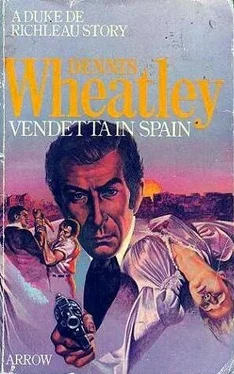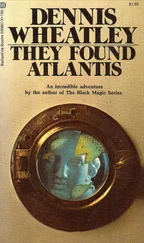In vain de Richleau asked to be allowed to speak to General Quiroga on the telephone. Urgoiti, evidently still smarting under his insults, flatly refused. A uniformed man appeared in answer to the Chief's summons, others were sent for and the Duke and the red-headed man were both marched away, the latter loudly protesting that it was an outrage and that his name was Olozaga.
Locked in a solitary cell, the Duke took stock of the situation. When he had calmed down a little he had to admit to himself that he was in part to blame for what had happened. He had made a particular point with Quiroga about not wanting it to become generally known among the police that he was that Count de Quesnoy who had three years before worked against the anarchists and brought about the closing of the Escuela Moderna; but he had assumed that, before his arrival in Barcelona, the General had confided his true identity to the Police Chief. Evidently that was not so and the General could only have told Urgoiti that he was expecting a special investigator that evening to whom he wished him to give his full co-operation.
That being the case, when Urgoiti learned that Senor 'Gonad' had just shot one of his most promising detectives, and a man whom Urgoiti did not believe to be Ferrer declared that he knew 'Gomd' to be a Russian nihilist named Chirikov, the Police Chief had certainly had grounds for holding 'Gom&' until a full investigation into the question of his identity could be made.
About that the Duke felt no concern, for it could be only a matter of waiting until the morning; General Quiroga would be informed about what had happened, he would be released, and Urgoiti made to look a complete fool. But he was worried about Ferrer.
For a few minutes he wondered if he could possibly have been mistaken. The red-headed man certainly had only a vague resemblance to the Ferrer he had known in the past, and Urgoiti had been so positive that he was not. Yet as the Duke went back in his mind over the events of the evening his vague doubts were swiftly dissipated. Teresa had told him that Ferrer was living out at San Cugat under the name of Olozaga with Dolores Mendoza. For Dolores to have been there with a man who resembled Ferrer but was not him was beyond any possible coincidence. Then Ferrer's account of what had occurred had diverged considerably from the truth. He had said that two men had broken in; but that was not so. He said that he had hidden in a cupboard; but in fact he had been down in the cellar and had had to be smoked out. And he had^ made no mention at all of Dolores - obviously because if Urgoiti had sent out to have her picked up she would at once have been identified as one of Ferrer's closest associates and so put the noose round his own neck.
No, there could be no doubt about the red-headed man being Ferrer, but the thing that worried de Richleau was that, before he could get into touch with General Quiroga in the morning, Urgoiti might question Ferrer further, become strengthened in his opinion that the self-styled Olozaga really was an innocent person, and have him released. To have Urgoiti sacked later for his blunder would be little consolation for having lost the chance to bring Ferrer to justice.
The Duke was still speculating with considerable anxiety on such a possibility when, after about an hour, two warders entered his cell and one of them said to him, 'Senor Chirikov, we have orders to search you.'
'Chirikov is not my name,' he replied with a frown. 'Here I am known as Carlos Gomd.'
The warder shrugged. 'Chirikov is the name you're under on the charge sheet and that's good enough for us.'
'Charge,' repeated de Richleau. 'What am I charged with?'
'With the wilful murder of Detective Veragua. His body has just been brought in. Come on, now. No nonsense. Get your clothes off and quick about it.' the surprise of his life
For a moment de Richleau thought of protesting; but he quickly realized that it would be useless. The two men, evidently under the impression that he was a thug who had killed a member of the police force, were scowling at him and would clearly have jumped at the least excuse to give him a beating-up.
As he took off his clothes, garment by garment, they went through them. He had already been relieved of his own automatic, and the one that had belonged to Veragua, before being put into the cell. Now they took his #police card, his wallet and his loose change, then returned his clothes and left him.
He re-dressed with a set face, now gravely alarmed by a new thought that had suddenly come to him. Could it be that Urgoiti had known all the time that the red-headed man was Ferrer, and be one of the police against whom Don Alfonso had warned him - a fanatical Catalan who was secretly doing his utmost to protect the anarchists? Could it possibly be that Urgoiti had twisted the situation to suit his own ends - that he meant to let Ferrer go, and to frame the man who had caught him for the murder of Veragua?
22
The Surprise of His Life
For a few moments de Richleau stood staring at the steel door of his cell. The thought that Urgoiti might be hand in glove with his enemies and that, if so, he had fallen into a trap, was an appalling one.
Then, with a shrug, he relaxed, convinced that he was letting his imagination run away with him. Urgoiti might be a self-opinionated and somewhat thick-headed official, but a man so high up in the service could hardly be a traitor. After all, he, de Richleau, had admitted to shooting Veragua, and now that the detective's death had been confirmed it was no more than normal procedure that he should be charged with it.
But why should he be charged as 'Chirikov' instead of as 'Gomd'? That could only mean that Urgoiti was accepting Ferrer's word rather than his. And it was Urgoiti who had selected Veragua to act as his constant companion during his investigation.
De Richleau sat down on the iron bed with which the cell was furnished. His thoughts were racing. He tried to persuade himself that everything would be all right in the morning. As he had said that he might not be back until very late Quiroga would not be waiting up for his return, but when he did not appear next day it was certain that the General would inquire of Urgpiti what had become of him. At the worst Urgoiti could only be keeping him out of the way until he had made a pretence of questioning Ferrer, then released him and given him a good start to get well clear of the city to a new hiding place. That was it. Then explanations would ensue. Urgoiti would make the most abject apologies; but Ferrer would already be beyond danger of recapture.
293
But Urgoiti was not going to get away with it. The Duke meant to see to that. Good tough old Quiroga, the scourge of the Barcelona anarchists, would support him. If need be he would go to the King. By the time de Richleau had done with him Urgoiti would have lost his job and his pension, and be extremely lucky if he did not have to serve a prison sentence into the bargain.
All the same, when the Duke lay down on the truckle bed and tried to get to sleep his mind continued to be harassed by so many unnerving possibilities that it refused to rest. Several times he tried to concentrate his thoughts on Gulia in her big warm bed and the joys they had experienced there, but, try as he would, he could not keep them on her; so during the long hours he did little more than doze, then start awake again with renewed anxiety at the extraordinary situation in which he found himself.
Morning brought nothing to allay his fears. On the contrary. At seven o'clock he was marched out to give himself a wash, and on returning to his cell a breakfast was dished out to him that looked so revolting that he decided not to eat it. For over an hour afterwards he sat gloomily on the edge of his bed, then a young Artillery Lieutenant was shown in to him.
Читать дальше












